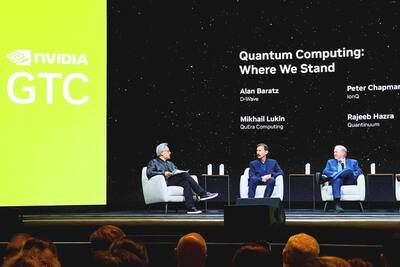Soap maker Mary & Majestic Inc (美琪生技) yesterday said that it will spend NT$700 million (US$23.12 million) to build a new factory in Xinwu Township (新屋鄉), Taoyuan County, in April, aiming to increase its annual revenue to between NT$1 billion and NT$1.5 billion from the current NT$500 million in the next five years.
The construction of the new factory will be completed by the end of the first quarter next year, company general manager Alfred Woo (吳英偉) told reporters yesterday.
The company expects the government will finish its inspection for PIC/S GMP (Pharmaceutical Inspection Convention and Pharmaceutical Inspection Cooperation Scheme, or the guide to Good Manufacturing Practice for products) certificate by September next year to allow the plant to start operating, he said.
The New Taipei City-based (新北市) company needs a factory in line with PIC/S GMP standards for making medicated soaps, which would allow the company to attract more orders on a contract basis, Woo said.
With the new factory, the company also plans to establish a new brand and enter the cosmetic products segment, he added.
Currently, contract orders account for about 50 percent of the company’s annual revenue, Woo said.
Mary & Majestic accounts for between 3 percent and 5 percent of the soap market in Taiwan, which is led by global brands Dove and Lux.
However, in terms of medicated soap, the 71-year-old firm has the largest market share in Taiwan, trailed by Chunghwa Biomedical Technology Co (中化生醫), which sells its products under the brand “GREEN” (綠的).
The company has tapped the potential market in China in recent years, with sales of between NT$20 million and NT$30 million a year.
Woo said that the company sells its products to China via distributors and faces a 10 percent import tariff there.
“The government should expedite its talks with China to lower the tariff,” Woo said, adding that Unilever PLC ships its soap products to Taiwan tariff-free from its Chinese factories.
Woo made the remarks after Mary & Majestic yesterday donated 30,000 bottles of anti-bacterial hand mousse worth NT$5 million to public elementary schools in New Taipei City.
Like flavored soap and baby soap, medicated soap is a kind of specialty soap that enjoys higher value, but with a small share of the market.
Mary & Majestic marketing manager Richard Tang (唐皓晃) said the medicated soap market remains stable in Taiwan, with alternative products offered by more manufacturers in recent years.
“There are loyal users of medicated soaps in Taiwan, mostly senior citizens working in the manufacturing industry or small auto shops. People also increase their use of the soap when there is any outbreak of infectious disease,” Tang said.

Anna Bhobho, a 31-year-old housewife from rural Zimbabwe, was once a silent observer in her home, excluded from financial and family decisionmaking in the deeply patriarchal society. Today, she is a driver of change in her village, thanks to an electric tricycle she owns. In many parts of rural sub-Saharan Africa, women have long been excluded from mainstream economic activities such as operating public transportation. However, three-wheelers powered by green energy are reversing that trend, offering financial opportunities and a newfound sense of importance. “My husband now looks up to me to take care of a large chunk of expenses,

SECTOR LEADER: TSMC can increase capacity by as much as 20 percent or more in the advanced node part of the foundry market by 2030, an analyst said Taiwan Semiconductor Manufacturing Co (TSMC, 台積電) is expected to lead its peers in the advanced 2-nanometer process technology, despite competition from Samsung Electronics Co and Intel Corp, TrendForce Corp analyst Joanne Chiao (喬安) said. TSMC’s sophisticated products and its large production scale are expected to allow the company to continue dominating the global 2-nanometer process market this year, Chiao said. The world’s largest contract chipmaker is scheduled to begin mass production of chips made on the 2-nanometer process in its Hsinchu fab in the second half of this year. It would also hold a ceremony on Monday next week to

TECH CLUSTER: The US company’s new office is in the Shalun Smart Green Energy Science City, a new AI industry base and cybersecurity hub in southern Taiwan US chip designer Advanced Micro Devices Inc (AMD) yesterday launched an office in Tainan’s Gueiren District (歸仁), marking a significant milestone in the development of southern Taiwan’s artificial intelligence (AI) industry, the Tainan City Government said in a statement. AMD Taiwan general manager Vincent Chern (陳民皓) presided over the opening ceremony for the company’s new office at the Shalun Smart Green Energy Science City (沙崙智慧綠能科學城), a new AI industry base and cybersecurity hub in southern Taiwan. Facilities in the new office include an information processing center, and a research and development (R&D) center, the Tainan Economic Development Bureau said. The Ministry

Nvidia is to open a quantum computing research lab in Boston, where it plans to collaborate with scientists from Harvard University and the Massachusetts Institute of Technology, Nvidia CEO Jensen Huang (黃仁勳) said on Thursday. Huang made the announcement at Nvidia’s annual software developer conference in San Jose, California, where the company held a day of events focused on quantum computing. Nvidia added the program after Huang in January said that useful quantum computers are 20 years away, comments that he sought to walk back on Thursday while joined onstage by executives from quantum computing firms. “This is the first event in history